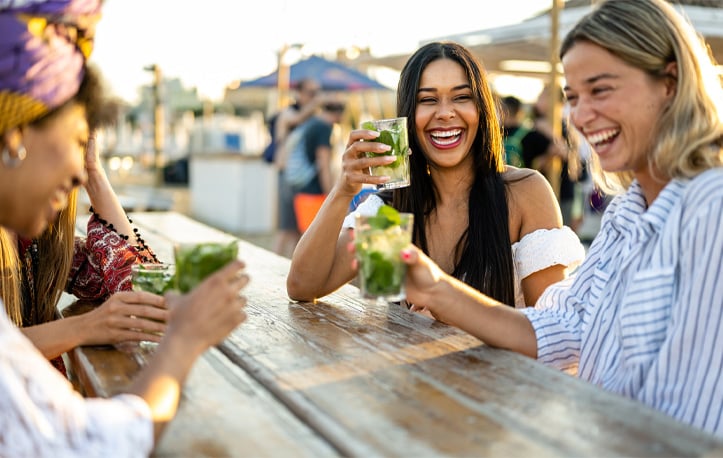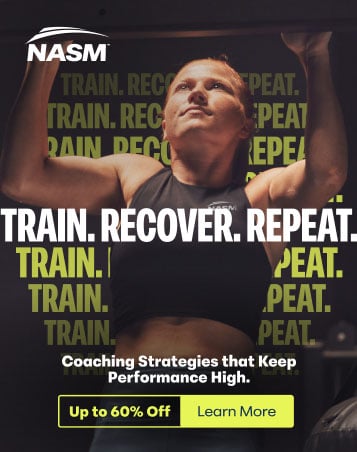There are a lot of phrases to describe the way we drink or don’t drink alcohol. In fact, it seems as though we’re creating new phrases all the time. I’m sure you’ve heard of “sober curious” or maybe even “sober-ish,” but what about “tempo drinking” or “flex drinking”? The latter are terms to describe switching between alcohol and non-alcoholic drinks during different intervals during the week or even switching back and forth within a single night.
There are also entire holidays dedicated to not drinking alcohol––Dry January, Sober October, and Dry July. During these months people give up or reduce drinking alcohol and may even choose non-alcoholic drinks to replace drinks with alcohol.
If you’re considering the role alcohol plays in your life, it can all get a little confusing, but it doesn’t have to be. There’s one catch phrase that sums it all up, whether you drink alcohol or not, whether you only drink on the weekends or take off drinking alcohol for the entire month of January. That word is mindful drinking.
What is mindful drinking?
Mindful drinking aligns your alcohol consumption with your goals, whether they're related to health or other aspects of life. It's about drinking with intention, breaking free from habits, peer pressure, and conformity. Given the potential health risks of alcohol, it's crucial to assess how it fits into your life and supports your objectives.
Consider a graduate student preparing for a test or an athlete aiming for peak performance. How does drinking align with these goals? Perhaps the student opts for occasional drinking, alternating with non-alcoholic beverages during stressful periods. Similarly, the athlete may choose to consume alcohol during the off-season or abstain entirely while remaining sober curious.
The key is recognizing that you have choices. Drinking doesn't have to be automatic in social situations; there are alternatives. While alcohol is optional, connection, a vital component of health, is not.
Join Derek and “Better Than Fine” podcast host Darlene Marshall as they re-examine our relationship with alcohol.
The rising trend of mindful drinking
Mindful drinking emerged around a decade ago with the rise of no- and low-alcohol options and influential books like "Mindful Drinking" and "Sober Curious." Yet, its roots trace back to ancient cultures like the Aztecs and Greeks and even appear in foundational religious texts. In the mid-19th century, mindful drinking was called Temperance, championed by figures like Abraham Lincoln.
Unfortunately, it later led to Prohibition. Today, mindful drinking transcends specific cultures or religions, focusing on individual goals over legislation. It's an intrinsic approach based on education and strategies applicable to anyone, as shared in NASM’s all-new course that I helped author, Mindful Drinking. In this course, I provided guidance and direction while sharing my expertise and passion for this subject and how it affects our overall health. Learn more about NASM’s Mindful Drinking Course here.
Tips for Practicing Mindful Drinking
In my course, I tried to spell out the best strategies for drinking mindfully using my acronym, RATE, which stands for Replace, Avoid, Temper, and Elicit Help. Under each strategy are several tactics that can help you along the way.
When Replacing alcoholic drinks, use tactics like Propping—using a non-alcoholic drink that mimics alcohol. For instance, tonic water in a rocks glass with a lime wedge imitates a Gin & Tonic. Propping helps you socialize without feeling the need for an alcoholic drink, allowing you to decide how you want to drink.
Another way to replace alcohol is to try non-alcoholic beers, wines, spirits, ready-to-drink cocktails, and cocktails. There has been an explosion of quality non-alcoholic beverages, even analog beverages that look and taste like existing categories or brands.
Avoiding certain scenarios where you either feel compelled or are even pushed into drinking alcohol is necessary in some cases. That might be as simple as creating equally compelling or even envy-worthy scenarios where you hardly miss the drinking occasion. For me, that means rewatching one of my all-time favorite movies with a close friend or even taking care of myself with a massage or gentle stretching session and making one of my favorite healthy meals from scratch.
Tempering involves switching between no- and low-alcohol drinks or opting for low-alcohol options. Consider factors like ABV, volume, and the drinking scenario. Plan your night by outlining what you intend to drink. Elicit Help by coordinating plans with a friend or using a mindful drinking app.
These tips are just some examples of strategies and tactics to help you drink more mindfully. Helpful articles like these can be found in Derek’s free newsletter, Positive Damage , if you want to learn more.
From the Doctor’s Desk: Mindful Drinking Benefits
Avoid Misery the Day After
There are many benefits to drinking mindfully, not least of which is avoiding a hangover the next day. But did you know that, for some, any amount of alcohol drink over their normal consumption––even if it’s only a few drinks––can induce a hangover, even low alcohol, which includes a negative array of effects from nausea to brain fog. This, of course, can greatly affect a person’s performance, including both physical and mental exertion.
Get Better Sleep
Alcohol also has very well studied effects on our sleep and can cause poorer quality of sleep. There are several mechanisms that may affect this but among them is that alcohol can cause a “rebound effect” where we wake up when we “sober up” in our sleep. In addition, alcohol suppresses REM sleep, a critical stage in sleeping that affects emotional regulation. By reducing the amount of alcohol you consume or eliminating alcohol altogether you can improve the quality of your sleep, which will affect not just recovery but your overall alertness and mood.
Be Ready to Play
While there are many other health benefits from mindful drinking, it's important to know the role that alcohol can play in sports performance. From pickleball league to professional competition, drinking alcohol can influence our psychomotor skills, hand-eye coordination, and accuracy and balance.
There are also potentially long-term effects of alcohol misuse, or heavy drinking, that can lead to skeletal muscle weakness and atrophy. By using alcohol in line with our goals, we can potentially feel better and perform better in sports.
Navigating peer pressure and alcohol
Facing peer pressure to drink can be awkward, from ordering at a bar to social events like weddings. While it might feel isolating, remember the consequences of drinking impact you the most. Stand your ground with a simple "I don't want to" as a valid reason to decline.
To avoid embarrassment, try propping or opt for non-alcoholic alternatives like sparkling wine. Offer to get the round to choose your drink discreetly or use reasons like early meetings or workouts to decline. Nurture relationships with those who share your goals or offer support.
The proof is in the pour: success stories in mindful drinking
Mel had a particular problem with mindful drinking. She was open to drinking less or even substituting no- and low-alcohol cocktails but had a fear that she would be perceived as less fun or even not enjoy things as much herself. Alcohol is, no doubt, part of our celebrations and connections. As such, it’s sometimes hard to imagine a world without it. She chose to use one of the strategies in my RATE acronym––Replace.
The next time she was scheduled for a date, instead of choosing a place that serves alcohol, she asked if they could go to a rock-climbing gym instead. Her suggestion was enthusiastically received, and they went rock climbing instead of sitting at the bar. Not only was it active, healthy, and had plenty of space for them to get to know each other. It was fun. No alcohol needed.
Mindful drinking is about how you want to feel, acknowledging alcohol's impact on mood and health. It's not just about drinking or not; it's making choices aligned with your goals to ensure you feel exactly how you want.

















